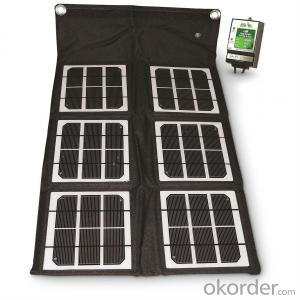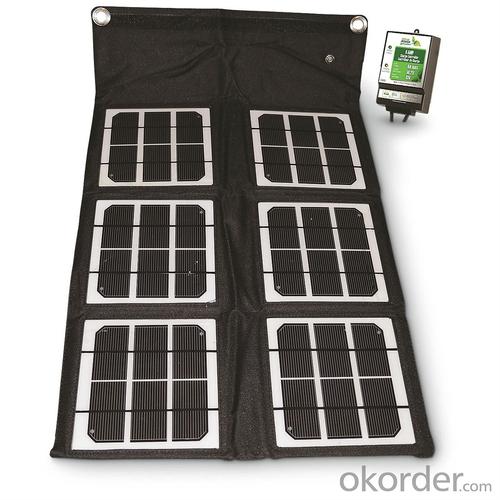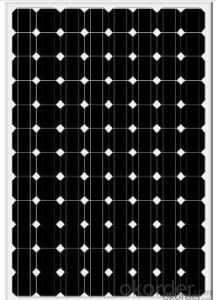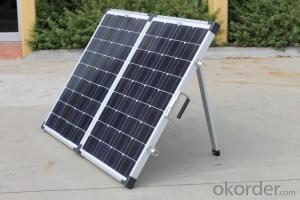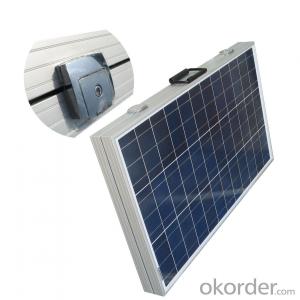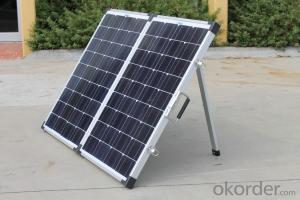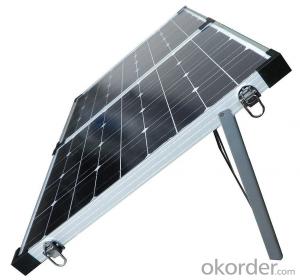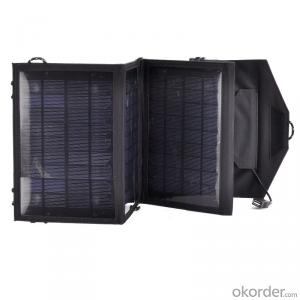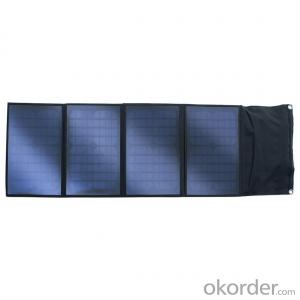Sun Electronics - 110W Folding Solar Panel with Flexible Supporting Legs for Camping
- Loading Port:
- Shanghai
- Payment Terms:
- TT OR LC
- Min Order Qty:
- 1000 watt
- Supply Capability:
- 10000 watt/month
OKorder Service Pledge
OKorder Financial Service
You Might Also Like
Specification
Product Description
Folding module kits are designed to provide portable 12 volt power wherever you need it.PoPwer available from 20W to 240W
Features:
· Padded, moulded carry bag
· Heavy duty carry handle, hinges and clasps Stainless steel telescopic&adjustable legs
· Weatherproof solar charge controller with LED indicator
· 5m cable with heavy duty Anderson connectors between module-regulator & regulator-battery clamps
· All cabled up ready to use
· 2 year warranty
These kits are the ideal solution for 4WD, camping, caravaning, boating and recreational activities whereverpower is required for lights, small TV, camping fridge, pump or other small appliances.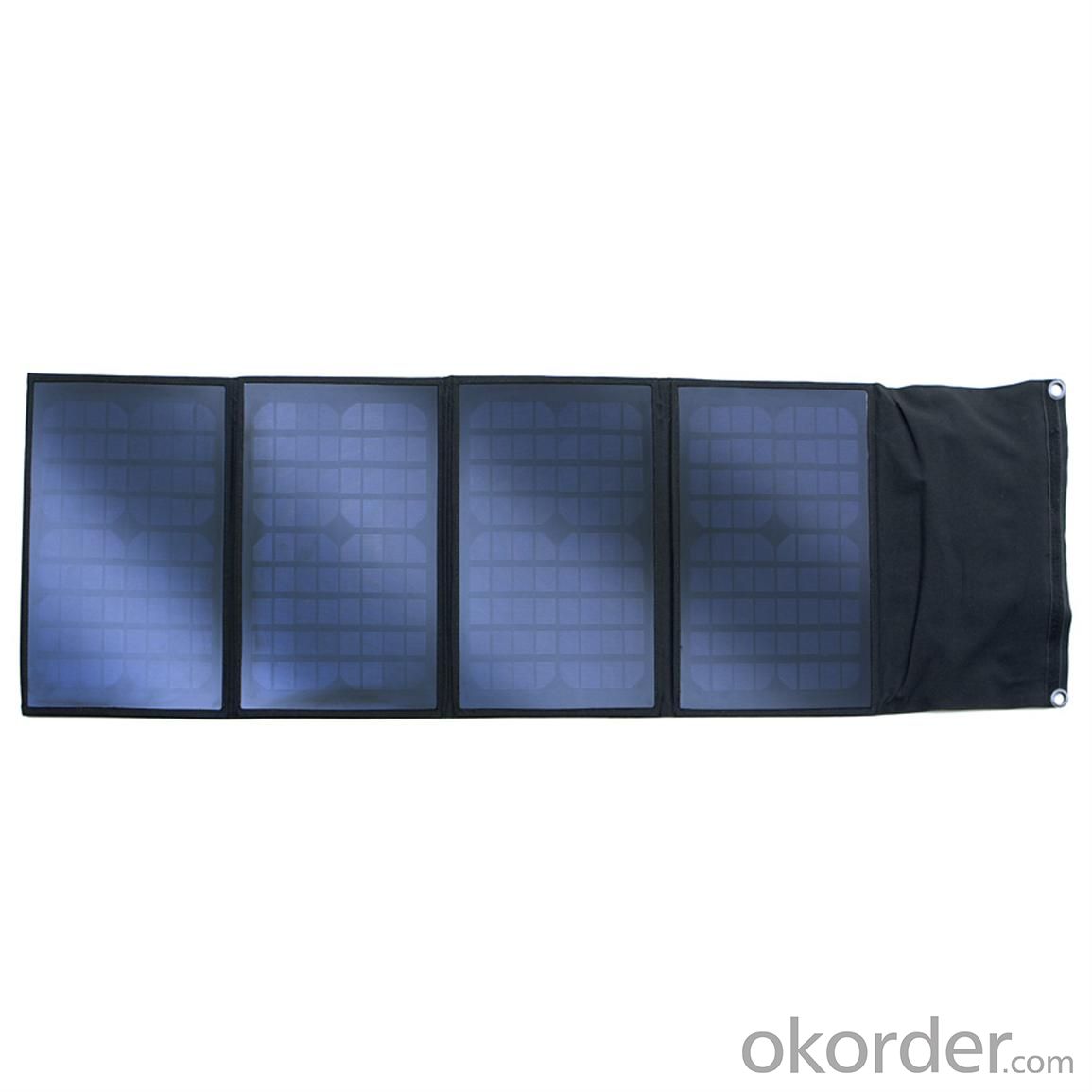
| Nominal Peak Power | 110W | 120W (2 x 60W) | 160W (2 x 80W) | 200W (2 x 100W) |
| Power tolerance | 3% | |||
| Cell type | Monocrystalline/Polycrystalline | |||
| Open circuit voltage (Voc) | 21.6V | |||
| Voltage at maximum power (Vmp) | 17.6V | 17.5V | 17.5V | 17.5V |
| Short circuit current (Isc) | 4.9A | 7.4A | 9.88A | 12.34A |
| Current at maximum power (Imp) | 4.54A | 6.86A | 9.14A | 11.42A |
| Maximum system voltage | 1000VDC | |||
| NOCT (Nominal Operating Cell Temperature) | 45 C +/-2 C | |||
| Operating temperature - module | -40 C to +85 C | |||
| Operating temperature – charge | -35 C to +55 C | |||
| Module folded size (mm) in carry bag | 505x550x60 | 505x825x80 | 505x1005x70 | 670x1005x70 |
| Module open size (mm) | 1014x550x30 | 1014x825x35 | 1014x1005x35 | 1344x1005x35 |
| Module net weight (kg) | 9.2 | 13 | 15.2 | 19 |
| Module gross weight (kg) | 11 | 16 | 19.4 | 23.2 |
| Solar charge controller | PWM 12V 10A; IP65 rated | PWM 12V 20A; IP65 rated | ||
- Q: How do solar panels affect the property's energy management system?
- Solar panels can significantly impact a property's energy management system by generating clean and renewable electricity. They reduce the reliance on traditional power sources, thereby lowering energy costs. Solar panels also allow for greater control over energy production and consumption, enabling property owners to better manage their energy usage and potentially even sell excess electricity back to the grid.
- Q: I'm part of the Sustainability group at school, the school principal is a d**k and doesn't care about the environment, he only cares about money.Me and the group will be talking in front of him and the school council (the people in-charge of the school's money) To convince them to put solar panels on the school roofs.I know that it definitely will help the school save on electricity bills, but it WILL cost a lot of money to put them in.In the end we just wanna reduce carbon emissions!HELP :)
- When okorder / Good luck but the best way to win is to find a way to get it done and then they can't say no.
- Q: Can solar panels be used in areas with high pollution?
- Yes, solar panels can be used in areas with high pollution. While pollution can reduce the efficiency of solar panels to some extent, they can still generate electricity in such areas. Regular cleaning and maintenance of the panels can help mitigate the impact of pollution and ensure their optimal performance. Additionally, the use of advanced technologies and materials in solar panel production can further enhance their resilience to pollution.
- Q: Can solar panels be used in conjunction with a backup generator?
- Yes, solar panels can be used in conjunction with a backup generator. This setup is known as a hybrid solar power system and it allows for continuous power supply even during periods of low sunlight or when the solar panels are not generating enough electricity.
- Q: Are solar panels suitable for residential use?
- Yes, solar panels are highly suitable for residential use. They provide a sustainable and renewable source of energy, reduce electricity bills, and contribute to a cleaner environment. Additionally, advancements in technology have made solar panels more efficient and affordable, making them a practical choice for homeowners.
- Q: Can solar panels be installed on a government building or facility?
- Yes, solar panels can be installed on a government building or facility. In fact, many government entities have already started incorporating solar energy as a sustainable and cost-effective solution to meet their energy needs. Solar panels not only help reduce carbon emissions but also provide long-term savings on electricity bills.
- Q: I have been thinking about getting solar panels for my house. What do you think I should get? Companies? Prices? I also have another question. How much energy can a small solar panel produce?
- The price of solar systems have dropped dramatically in the last 5 years. I would say it has reached to the point that it financially makes sense to go solar! An average home in [California] with $200 monthly electric bill would need a 7.25 kW system to offset 00% of their electric bill (means you won't have to pay anything to your utility company). Average price of the panels are anything between $2,500-3,500 per kW (after 30% Federal Tax credit which might expire at the end of 206). So, average system price will be $7,000-$25,000. If you wanna buy the system your loans monthly payments will be around $40-50 for 2 years and after that your system is paid off and you can enjoy free electricity! Total saving over 25 years can exceed $70,000. Regarding the selection of the right panels or the best company in your area, it varies case by case, city by city. Pick My Solar offers a free service to homeowners to choose the right fit for their home. It's like Expedia or Priceline for residential solar market.
- Q: I want to purchase some or one solar panel for my home. I don't know where to buy them from. I've loooked online and if i could buy them online that would be best, but if you knew of a website that has good prices than that would be great!Thanks
- I okorder Hope this helps.
- Q: im doin a science experiment and i have a battery that is 3.6 volts , does it matter wut voltage the solar panel that im connecting it to is . Does it need to match , be less or does voltage have no effect . If so wut does matter when choosing the type of solar panel to power a bettery?
- You really need a little more infomation about your battery. It should have a recommended range of charging current. You should not exceed that range. Your solar cells must be a higher voltage than the battery, but you should not connect the cells directly to the battery. First, you need a diode in the line to keep the battery from draining into the solar cells when there is no light. Second, you need a resistor to limit the charging current. You have a 3.6v battery. Let's say the charging current is 0.A. Use a 5v solar cell and silicon diode. The diode will drop the cell voltage to 4.3v. The voltage across the resistor will be .7v for .A current, you need a 7-ohm resistor.
- Q: Ok, so my homework was to research and write about how solar panels and solar furnaces work and about their construction. We didn't even take one lesson on it in class and we are not allowed to copy and paste much and have to keep it simple wtf? Its soo annoying as we have hardly took it in class. Please can someone help.
- A solar panel (photovoltaic module or photovoltaic panel) is a packaged, connected assembly of solar cells, also known as photovoltaic cells. The solar panel can be used as a component of a larger photovoltaic system to generate and supply electricity in commercial and residential applications. Because a single solar panel can produce only a limited amount of power, many installations contain several panels. A photovoltaic system typically includes an array of solar panels, an inverter, and sometimes a battery and interconnection wiring.
Send your message to us
Sun Electronics - 110W Folding Solar Panel with Flexible Supporting Legs for Camping
- Loading Port:
- Shanghai
- Payment Terms:
- TT OR LC
- Min Order Qty:
- 1000 watt
- Supply Capability:
- 10000 watt/month
OKorder Service Pledge
OKorder Financial Service
Similar products
Hot products
Hot Searches
Related keywords
